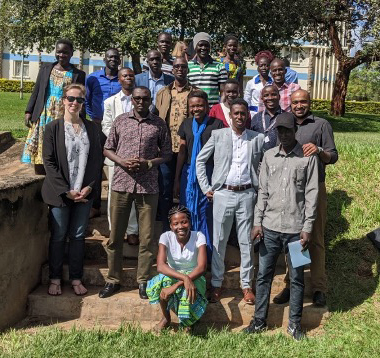“No research on us without us:” Participatory research from three refugee camps evaluating connected learning higher education programs
| Event Date: | September 3, 2020 |
|---|---|
| Speaker: | Dhinesh Radhakrishnan, Mark Okello, Talil Mohamed, Ambalali Stephen |
| Speaker Affiliation: | Dhinesh is a recent PhD Graduate. See Bio Section for all affiliations |
| Time: | 3:30 - 4:20 PM |
| Location: | Virtual: Link is included in calendar request. |
| Priority: | No |
| School or Program: | Engineering Education |
| College Calendar: | Show |

Image. CLCC researchers at the Nairobi research meeting
Traditionally, research and assessments on people's unique needs impacted by conflict often fail to engage the very population that they seek to understand sufficiently. In this seminar, we present the radical approach of participatory evaluation research that initiates and sustains grassroot changes fostered by practical, critical, and revolutionary activity. In the participatory evaluation process, the learners are not just respondents to data collection methods created by researchers, nor are they consultants on researcher-led evaluations. Instead, they work in equal partnership as creators of knowledge, shaping their evaluation questions, developing their unique methods, analyzing and interpreting the data gathered, and reporting their findings. In order to do this, the learners are provided with support to perform the evaluation.
The Connected Learning in Crisis Consortium (CLCC), supported by the Open Society Foundation, undertook a yearlong, multi-institutional, multi-site, multi-program participatory research with DeBoer Lab, Purdue University as the Principal Investigator (PI), and the University of Geneva as the Co-PI. Three research sites of consortium members were selected: Kakuma refugee camp and Dadaab refugee camp in Kenya, and Adjumani refugee settlement in Uganda. Twenty-three student researchers were identified in total across the camps to learn and conduct research. In this seminar, three researchers from the project will discuss the process we adopted in the participatory evaluation research, the research design, and the preliminary findings from evaluating the higher education program offered in their respective camps.
Speaker Bios
Dhinesh Radhakrishnan, is a recent alum of the Purdue School of Engineering Education Ph.D. program. His research work is concentrated in the areas of localized engineering programs for community development in marginalized communities, teacher professional development, and participatory research.
Mark Okello Oyat is a Ugandan refugee living in Dadaab Refugee Complex, Kenya. He graduated from York University this year, 2020, and have recently co-founded a refugee-led CBO that's focused on making research informed change in the camps using Participatory Evaluation and Action Research.
Mohamed Talil is a Somali interpreter and independent researcher from Kakuma Refugee Camp and has worked with the Refugee Studies Center (RSC), Oxford University and World Food Programme. He is currently working on a CLCC researcher for higher education with Inzone-UNIGE. He is pursuing his bachelor’s degree in Public Administration with Southern New Hemisphere University.
Ambalali Stephen is a Ugandan national who is currently working with Norwegian Refugee Council as a facilitator on a CLCC research for education for humanity through the partnership of NRC and Arizona State University in Adjumani’s Nyumanzi refugee settlement. He has attained diploma in community health management and computer science and information technology from Nsamizi training institute and Kampala University, respectively.
